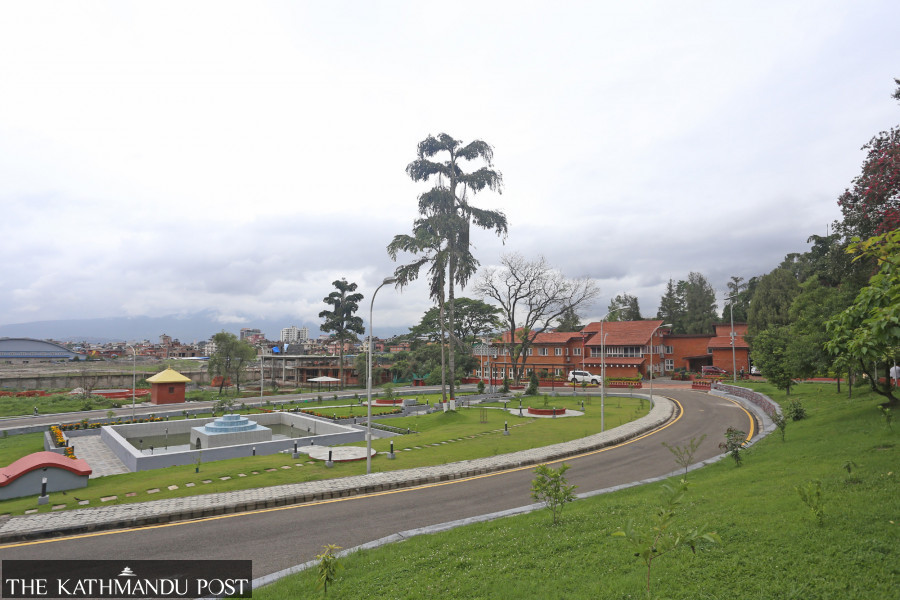National
Baluwatar land scam: Arrest warrants issued against 300 individuals for document forgery
Central Investigation Bureau of Nepal Police must file forgery cases against them by January 21.
Prithvi Man Shrestha & Shuvam Dhungana
The Kathmandu District Court has authorised the Central Investigation Bureau of Nepal Police to arrest over 300 individuals on the charge of forging documents to capture government land at Lalita Niwas inside the Prime Minister’s Residence at Baluwatar, Kathmandu.
Even though the Commission for Investigation of Abuse of Authority had filed corruption cases against 175 individuals including three former ministers such as Bijay Kumar Gachhadar, Dambar Shrestha and Chandra Dev Joshi in February 2020, the bureau had initiated separate investigations against those allegedly involved in the infamous scam.
Bureau’s Chief Deputy Inspector General Dhiraj Pratap Singh said the case was under investigation but refused to divulge about the people to be arrested saying that will affect the investigation.
Superintendent of Police Shyam Kumar Mahato, also the spokesperson for the bureau, told the Post that arrest warrants have been issued against over 300 people as per the order of the Kathmandu District Court.
The bureau has so far arrested two accused. On December 21, the bureau had arrested Ram Kumar Subedi and his wife Madhavi Subedi, who are accused of aiding the illegal transfer of the government land into the hands of private individuals.
Spokesperson Mahato had told the Post that the couple was arrested as their direct involvement was found from the beginning in the Lalita Niwas land scandal.
Subedi, who was in the accounting business, had allegedly played a vital role in registering the government-owned Lalita Niwas land in the name of a person in collusion with Shobha Kanta Dhakal.
All three are also accused in the corruption case filed by the anti-graft body.
The bureau had sought the court’s approval to arrest over 300 people involved in the scam as it is preparing to file criminal cases against them.
“As per the Criminal Code 2017, we have to file criminal cases against them by January 11 because of the deadline set by the law,” said Mahato. “It means we are in the final phase of registering criminal cases against them.”
The cases should be filed within two years in the case of forgery of government documents while it should be done within six months in the case of other documents, as per Section 283 of the Criminal (Code) Act 2017.
“The police will not arrest everyone whose name is on the warrant list as it might take a long time searching each of them,” said an official at the bureau on the condition of anonymity. “However, everyone’s name will be included in the report which will be presented to the District Attorney Office for filing the case. Once the case reaches the court, the court will further send notice to everyone to present themselves in the court for recording their statements.”
As per Section 276 (3) of the Criminal (Code) 2017, a person involved in forgery is subjected to imprisonment of up to 10 years and a fine of up to Rs100,000.
As per Section 276 (5) of the Criminal (Code) Act, if somebody has acquired a property through forgery, the property should be returned to the actual owner. Likewise, if the property acquired through forgery has been damaged, the actual property owner should be compensated with an equivalent property by the perpetrator.
The perpetrator who damaged the property acquired through such illegal means, is also subjected to a fine equivalent to the damage, according to Section 276 (4) of the Criminal (Code) Act 2017.
According to Mahato, the CIB was preparing to file four separate cases of forgery against the people involved in the scam. “As the forgery took place on four different dates, a maximum of four cases will be filed against the accused,” he said. “If someone was not involved in the forgery all four times, he or she will face a number of cases equal to the times they were involved.”
The scam was unearthed by a probe committee led by former government secretary Sharada Prasad Trital. The committee had discovered that 136 ropani 14 anna 2 paisa (6.96487 hectares) of government land had been illegally registered in the name of private individuals. Although these lands were initially owned by Subarna Shumsher, the late Nepali Congress leader, they were acquired by the government in the 1960s.
Those plots were illegally returned to Rana’s family after the restoration of democracy in 1990 on the grounds that the land had been taken by the Panchayat government for political reasons, even though the land had been acquired legally by paying compensation.
These plots were later sold and purchased in the name of different people, allegedly creating fake tenants which is known as Baluwatar scam.
Former deputy prime minister and minister for physical infrastructure and transport Bijay Kumar Gachhadar, and two former land reforms ministers Dambar Shrestha and Chandra Dev Joshi face corruption charges over the infamous Lalita Niwas scam.




 12.62°C Kathmandu
12.62°C Kathmandu















